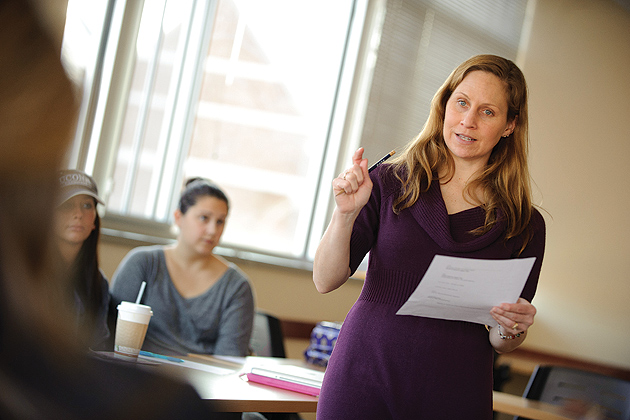
Wendy Glenn says there are two reasons she will always be a teacher at heart, even though today she is also a Fulbright Scholar, an expert in young adult literature, and director of teacher education in the Neag School of Education.
“I’ve always loved books; I’ve always loved writing,” says Glenn. “The second had more to do with the opportunity to build meaningful relationships with kids.”
One way in which she connects with students is through her interest in Young Adult (YA) literature.
Written for students 12 to 18 years old, YA literature has exploded in recent years as publishers realize that teenagers have more expendable income than in the past. Glenn puts these works through a critical literary lens, showing they can be evaluated like the classics.
“My work now is not only looking at these works from a critical perspective, but also thinking about the readers who will ultimately be picking them up,” says Glenn. “YA lit features voices of people who we don’t often hear, [who] expose us to the reality that not everybody sees the world the way we do.”
It’s that reality that brought Glenn to Norway as a Fulbright Scholar. For 10 months, the Arizona native worked with students in grades 8, 9, and 10 to help undermine the stereotypical portrayal Norwegian students have from watching American television, listening to American music, and reading American newspapers.
With topics like censorship in American public schools, the teenage experience in America and around the world, representations of young people of color in America, and sports, Glenn offered a more complicated view of what it means to be an American living in America.
“I visited probably 45 different schools in every region of Norway,” says Glenn. “From the more urban, densely populated city communities, to tiny, tiny towns where there were 15 students enrolled in the entire school, to schools along the coast, to schools where the polar bears live on the archipelago of Svalbard, religious schools, liberal schools, everything and anything in between. It was unbelievable.”
Glenn also provided professional development for teachers in those classroom communities, modeling different teaching practices for use in their schools. Changing demographics are bringing more immigrants to Norway, and with them come different cultures and languages. “In the U.S., we’ve supported language immersion for a long time,” says Glenn. “How do you teach a group of 20 students when five or six of them speak a language that’s not Norwegian as their primary language?”
Now home, Glenn is back in American classrooms co-teaching with former students.
“I think it’s really important for faculty in teacher education to keep a foot in both of those worlds,” says Glenn. “I don’t know if we can effectively prepare future teachers if we’re not aware of the realities of schooling today and what teachers are grappling with. To me, that connection to schools is really important.”


